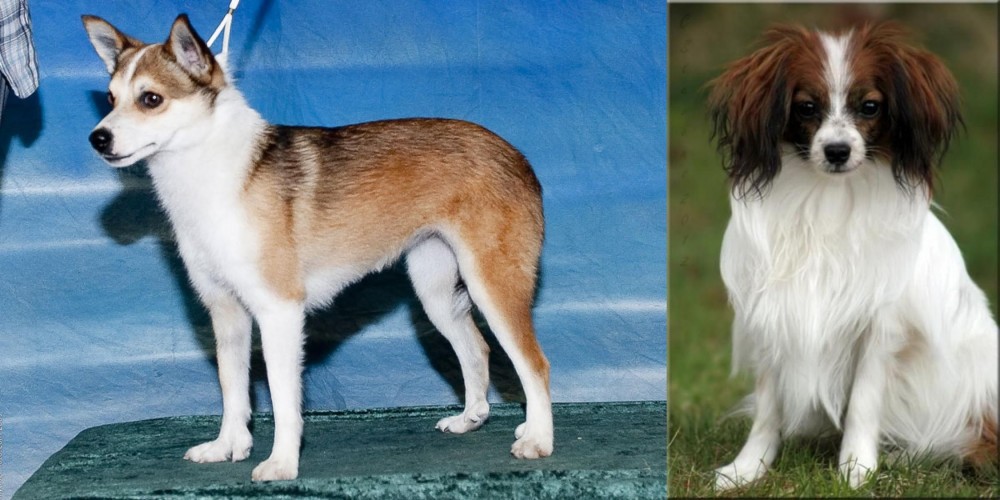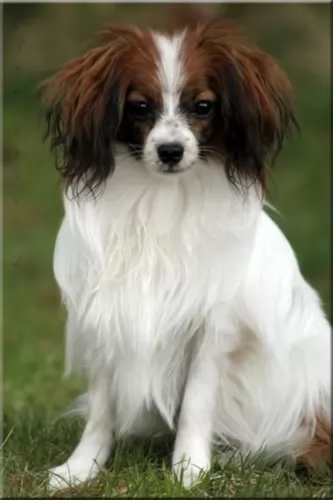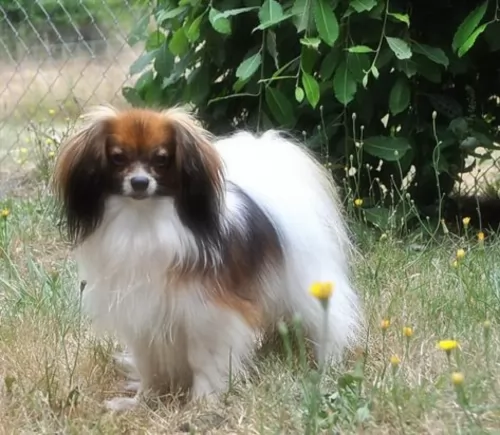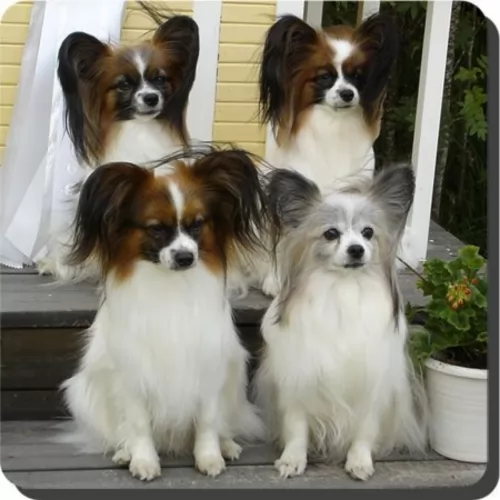 Petzlover
Petzlover Norwegian Lundehund is originated from Norway but Phalene is originated from France. Norwegian Lundehund may grow 12 cm / 5 inches higher than Phalene. Both Norwegian Lundehund and Phalene are having almost same weight. Both Norwegian Lundehund and Phalene has almost same life span. Norwegian Lundehund may have more litter size than Phalene. Both Norwegian Lundehund and Phalene requires Moderate Maintenance.
Norwegian Lundehund is originated from Norway but Phalene is originated from France. Norwegian Lundehund may grow 12 cm / 5 inches higher than Phalene. Both Norwegian Lundehund and Phalene are having almost same weight. Both Norwegian Lundehund and Phalene has almost same life span. Norwegian Lundehund may have more litter size than Phalene. Both Norwegian Lundehund and Phalene requires Moderate Maintenance.
 The Norwegian Lundehund hails from the island of Vaeroy, Norway and was created for the purpose of puffin hunting.
The Norwegian Lundehund hails from the island of Vaeroy, Norway and was created for the purpose of puffin hunting.
Now that these puffins are a protected species, the dog is no longer used for hunting and has become a companion dog.
The breed decreased in numbers during- and after World War II because the islands where he came from had an outbreak of distemper. It was in 1963 that another outbreak occurred and the dogs were almost wiped out. A breeding program saw their numbers being built up.
It was in 2011 that the dog was recognized by the American Kennel Club.
 The Phalène is a toy breed, and in fact the Papillon and Phalène differ only by their ears, but are exactly the same in all other ways.
The Phalène is a toy breed, and in fact the Papillon and Phalène differ only by their ears, but are exactly the same in all other ways.
Thought to have developed in Western Europe, its exact origin isn’t clear but it is an ancient breed, as paintings seem to indicate that it has been around since the 16th century.
It is essentially a companion dog today. The dog is classified as a variety of the Papillon by the AKC, with the FCI classifying it as a separate breed.
 As a spitz-type dog, with the Lundehund you’ll recognize the typical spitz-dog characteristics – the erect ears and the tail that curves over the back.
As a spitz-type dog, with the Lundehund you’ll recognize the typical spitz-dog characteristics – the erect ears and the tail that curves over the back.
He is a small to medium sized dog standing at 30 – 40cm and weighing 6 – 9kg. He is an active dog and is as agile as a fox.
He has a dense double coat which is white, reddish/tan with some black tips. He is a dog which sheds constantly.
Strangely this dog has 6 toes and his rear pads have elongated foot pads which have helped the dog be able to climb over rocks. He also has a flexible type of neck that is capable of craning back so that the head touches the spine. The dog has some unique features and wriggling in and out of small spaces is another of his characteristics. In fact he can do things that you would not imagine a dog could do.
When you have a Lundehund in your life you’ll agree he has a happy, amicable personality. He is non-aggressive.
He will require training and socialization as he is an independent dog who can be obstinate. He is quite aloof with strangers too and once he starts barking at them he tends to want to continue. Training him will put an end to that irritating behavior. He is a loving, loyal dog, enjoying the company of his human family.
 This toy breed stands at between 20 – 28cm in height and weighs around 4 – 5kg. He has floppy, silky ears and is a Papillon dog, and a Papillon with dropped ears is known as a Phalène.
This toy breed stands at between 20 – 28cm in height and weighs around 4 – 5kg. He has floppy, silky ears and is a Papillon dog, and a Papillon with dropped ears is known as a Phalène.
The dome of the head is rounded and the Phalene has a slim muzzle with bright, alert brown eyes and a black nose. The tail is well plumed and is carried over the back. The coat isn’t a double coat like many other dogs, but it is lustrous, being straight, long and smooth. The coat is available in a number of coat colors, essentially being a blend of white, tan, black and orange or fawn.
The Phalène is an intelligent dog, and they will be able to learn quickly and easily when you teach them how to sit, lie down or stay. Training and socialization is always excellent for dogs, even small ones like this as it teaches them to be obedient and well mannered.
The Phalene is a sociable, friendly dog but is inclined to be reserved around strangers. Phalènes are essentially lap dogs and they make great companions for all kinds of people as well as being great playmates for disciplined, kind children. Because he is small and calm, he makes a great pet for country- or city dwellers.
 The Norwegian Lundehund isn’t your everyday dog and in fact he is known as a primitive breed. Perhaps he wouldn’t be the best dog to have if you’re a first-time dog owners as training is quite difficult too.
The Norwegian Lundehund isn’t your everyday dog and in fact he is known as a primitive breed. Perhaps he wouldn’t be the best dog to have if you’re a first-time dog owners as training is quite difficult too.
People who are willing to take a chance on him say that with training and socialization he can become a loving canine companion.
 The Phalene is such a sweet little dog, and you can definitely count him as as ‘man’s best friend’. He just loves to be wherever his human family is, lapping up their attention indoors but also loving being with them outdoors. When well trained and socialized, these dogs make splendid playmates for children too.
The Phalene is such a sweet little dog, and you can definitely count him as as ‘man’s best friend’. He just loves to be wherever his human family is, lapping up their attention indoors but also loving being with them outdoors. When well trained and socialized, these dogs make splendid playmates for children too.
Small though he is, he makes a good watch dog too and he will bark to warn his human family of danger. Give him the love and care he so rightly deserves, and he promises to make you a splendid pet and companion.
 The Lundehund is prone to digestive disorders but even so he has got a good chance of living to be 11, 12, 13 or 14 years of age with good care.
The Lundehund is prone to digestive disorders but even so he has got a good chance of living to be 11, 12, 13 or 14 years of age with good care.
He is however, one of these dogs prone to health problems of which chronic intestinal disease is one. Its the kind of illness that can recur because it is resistant to treatment.
Experts on these dogs say that they should have a fecal test done every 6 months or so, saying that one thing a bit negative with this dog breed is that you may well be forking out quite a bit on chronic veterinary care.
 Your jaunty little Phalene can live to be up to 12 or 15 years of age if well cared for. Even so, there are always some of the more common dog illnesses worth knowing about, and we look at a few -
Your jaunty little Phalene can live to be up to 12 or 15 years of age if well cared for. Even so, there are always some of the more common dog illnesses worth knowing about, and we look at a few -
Any dog can get epilepsy – when your pet suddenly has a seizure or fit for no apparent reason. It can be disturbing to see, but with medication your pet can live a normal life.
Always keep a check on your pet’s eyes because there are a few eye diseases that can affect your pet and these are cataracts, progressive retina atrophy and entropion. Thankfully a veterinary ophthalmologist can help with the best treatment.
 Like any other dog, the Norwegian Lundehund will do well on the best quality food. If you buy him commercially manufactured food, check the ingredients on the packaging. Lots of these lower quality foods are made from ingredients that are toxic for your pet, so buy a good quality one.
Like any other dog, the Norwegian Lundehund will do well on the best quality food. If you buy him commercially manufactured food, check the ingredients on the packaging. Lots of these lower quality foods are made from ingredients that are toxic for your pet, so buy a good quality one.
Buy food according to your dog’s age and activity levels. To make his meals more interesting, add in some delicious home prepared food for him. Stay away from spicy, exotic foods and go for something like boiled chicken, brown rice and vegetables. Some raw meat added to the kibble from time to time can also do wonders for your pet as he requires a high-protein diet. Make sure he always has access to fresh, cool water.
Other ‘caring’ things to do to make sure your pet has a quality lifestyle is -
Brush his hair twice a week as he is a fairly heavy shedder. Not only does it keep the coat nice and shiny, it builds up a bond between you and your pet.
Check his ears and eyes regularly to make sure they are free from infection.
Clip his nails when they get long as your pet can hurt himself if the nails hook onto things.
Whenever he is ill, get him to the vet for a check-up.
Make sure he has a nice safe, dry, warm, snug place to sleep.
Keep him well exercised. A dog that is put into the backyard and more or less forgotten will be most miserable. Why get a pet if you don’t want to make him a 100% part of the family?
 These are energetic little dogs and will require getting a regular dose of exercise. He loves a walk and being allowed off his leash for a good run. He also loves ball games. Exercise is important for small dogs like this to ward off obesity.
These are energetic little dogs and will require getting a regular dose of exercise. He loves a walk and being allowed off his leash for a good run. He also loves ball games. Exercise is important for small dogs like this to ward off obesity.
These little dogs will need to have their ears checked and cleaned if you want to avoid ear infections. If you’re not sure how to clean the inside of the ears, rather leave it to an expert who can show you how its done. Small dogs always need to have their teeth checked regularly. He will also need to have his nails trimmed.
To maintain the long, silky coat, brush your dog at least twice a week. Some Phalene dog owners take their pet to the vet to have the coat professionally groomed and trimmed.